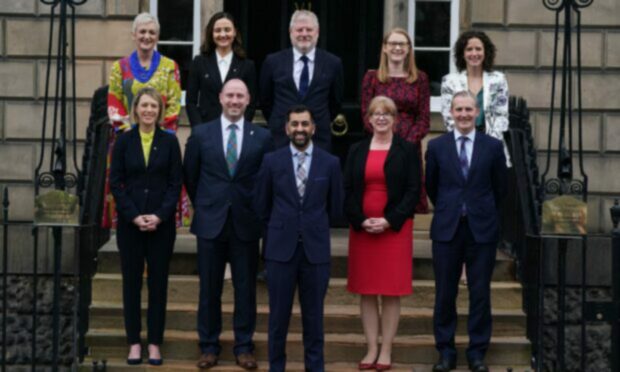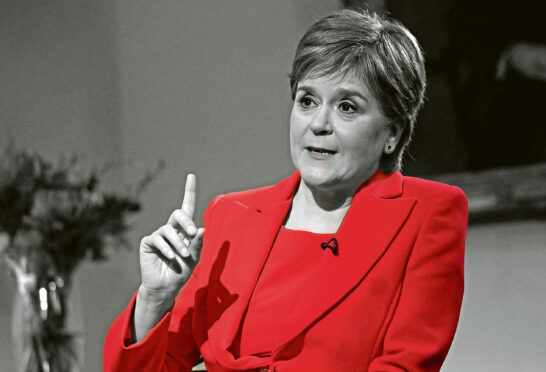
Kate Forbes has been called many things in recent weeks, so a comparison with one of old Hollywood’s most glamorous stars is unlikely to vex her.
I refer to an online joke using a still from the classic 1954 movie Brigadoon.
The picture shows the male characters, led by the legendary Gene Kelly, gazing in awe at female lead Cyd Charisse, framed against an improbable Highland landscape. Kelly and the men are depicted as the unionist commentators of Scotland, mesmerised by Forbes in the role of Charisse. (For those who are not experts in kitsch cinema, Brigadoon was a mythical village that appears for just one day every 100 years.)
This “meme”, created by supporters of Humza Yousaf, is meant to be cruel. But, just as Brigadoon bombed at the box office, the sarky joke backfires.
The ability to win the hearts of No voters is, one would have thought, a useful talent in an SNP first minister. And it’s not just about star quality. Charisse, a dancer, was admired for her grace – something Forbes has exhibited in buckets since she warmly congratulated Yousaf on his win.
The other side did not stay so classy. The team around the new first minister spun a story that Forbes rejected a role as rural affairs secretary because of work-life balance. It soon emerged the job involved implementing the Green policy of “no take zones”, deeply unpopular in the Highland fishing communities in her constituency. The new FM made Forbes an offer she had to refuse.
Yousaf won the contest on penalties after Forbes and Regan gained 52% of the first preference votes. Given the narrow margin of his victory, we might have expected him to deliver on his promise to practise Big Tent government.
Instead, he used his powers of patronage to create what some MSPs describe as a royal court, where those who pay homage are rewarded. Only one of the new ministers backed a Yousaf rival. Labour calls it the Chumza government.
Even more perplexing was the sacking of Keith Brown, the Justice Secretary. Brown was elected deputy leader of the SNP in 2018, gaining 55% of the party members’ vote – more than Yousaf. He could have been a unifying – and useful – figure. It would be wrong to say there are no able people in the cabinet or government. There are. But to lose Forbes and Ivan McKee, who are both respected by business, sends an unhelpful message.
The SNP has long been a social democratic party that believes in a mixed economy – a healthy private sector, public ownership where appropriate, and a safety net for the vulnerable. However, a disturbing narrative emerged during the campaign that sought to label Forbes a “neo-liberal” simply because she understands the importance of economic growth and recognises that an increased tax base helps deliver prosperity.
This worldview, which is shared by most voters, was weaponised against Forbes, despite her campaign’s focus on ending child poverty. It perhaps reflects the disproportionate influence of the Greens, who ideologically oppose growth, but also the post-Sturgeon SNP, which increasingly defers to the reductive sloganeering of the types who made Labour unelectable during the “Corbyn Surge”.
The parliament Humza Yousaf and myself first entered in 2011 was so different. The SNP had just won a historic majority government despite the voting system being designed to prevent that happening. That success came after four years in which an SNP minority government worked across the parliament to build consensus, creating a reputation for small, competent government. Their MSPs and ministers put in some shift to establish strong relationships across society, including with leading business people. Such was their success, Lord Foulkes, the Labour peer, hilariously accused the SNP government of “deliberately” improving public services, to gain the electorate’s approval.
The party also owed its success to unity and discipline. The 1990s SNP was deeply divided between gradualists who supported devolution and “fundamentalists” who took an “independence or nothing” approach. These divisions were healed, after much pain, in the mid-noughties, heralding the 2007 election success. Salmond’s cabinets included those who once stood on the other side of the debate, such as Kenny MacAskill or Alex Neil. After 2007, the only splits you saw happened on the party conference dancefloor, after a few too many tinctures.
There will be lots of partying in the court of King Yousaf this weekend. But a winner-takes-all approach is unwise, given the divisions exposed by the election. Unless the new SNP leadership learns from history, it could find support floating away like Brigadoon into the mist. Then the joke will definitely be on them.

Enjoy the convenience of having The Sunday Post delivered as a digital ePaper straight to your smartphone, tablet or computer.
Subscribe for only £5.49 a month and enjoy all the benefits of the printed paper as a digital replica.
Subscribe
